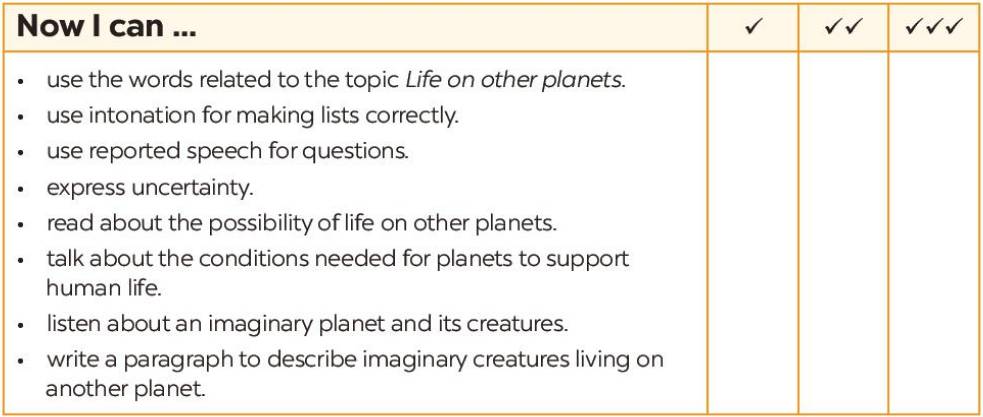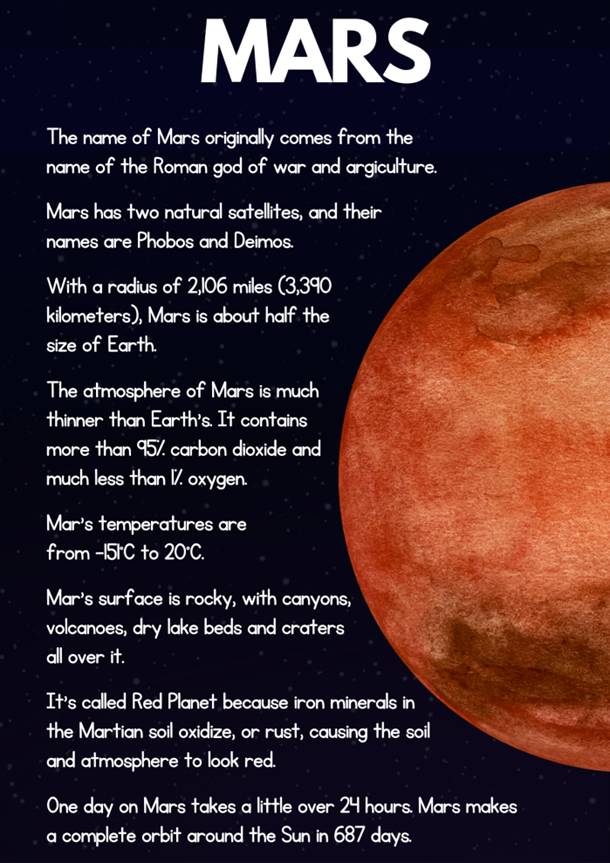a book that contains information about a subject. What is it? I need urgently

Những câu hỏi liên quan
a book that contains information about a subject: ___________________
a book that contains information about a subject
giúp mk vs
mk cần vào tối nay
Dịch:1 cuốn sách có chứa thông tin về 1 chủ đề
Đúng 0
Bình luận (0)
1. Choose a planet in our solar system that you like and search for the information about it.2. Design a poster about that planet, including: - The planet’s name: What does its name mean?- Size: How big is it?- Atmosphere: What is its atmosphere like? Is it a thick or a thin atmosphere?- Temperature: What is its average temperature? How hot and cold does it get?- Appearance: What does it look like?- Something special: Is there anything special about it?3. Present your poster to the class.
Đọc tiếp
1. Choose a planet in our solar system that you like and search for the information about it.
2. Design a poster about that planet, including:
- The planet’s name: What does its name mean?
- Size: How big is it?
- Atmosphere: What is its atmosphere like? Is it a thick or a thin atmosphere?
- Temperature: What is its average temperature? How hot and cold does it get?
- Appearance: What does it look like?
- Something special: Is there anything special about it?
3. Present your poster to the class.

Tham khảo
Hello everyone, today I will talk about Mars, the 4th planet in our solar system. The name of Mars originally comes from the name of the Roman god of war and agriculture. It may not seem like these two things go together, but they do. Mars protected those who fought for their communities and stayed home to raise crops for food. Mars has two natural satellites, and their names are Phobos and Deimos. With a radius of 2,106 miles (3,390 kilometers), Mars is about half the size of Earth. The atmosphere of Mars is much thinner than Earth's. It contains more than 95% carbon dioxide and much less than 1% oxygen. Mar's temperatures are from -151°C to 20°C. Mars is colder than Earth. If you were to stand on the surface of Mars on the equator at noon, it would feel like spring at your feet and winter at your head. Mar's surface is rocky, with canyons, volcanoes, dry lake beds and craters all over it. It's called Red Planet because iron minerals in the Martian soil oxidize, or rust, causing the soil and atmosphere to look red. One day on Mars takes a little over 24 hours. Mars makes a complete orbit around the Sun in 687 days. Thanks for listening.
Đúng 1
Bình luận (0)
Write a short paragraph (80-120 words) about your favorite subject at school, based on the suggested questions:
1. What is your favorite subject?
2. Who taught/ teaches you that subject?
3. What do you learn in the subject?
4. Is it easy or difficult? At home, what do you do to improve it?
5. Why do you like it?
1. My favorite subject is literature
2.My teacher is Ms. Yen
3. I learned how to write and how to communicate properly
4.It's hard for me but I just need a little patience and try
5. Because I want to challenge myself
Đúng 2
Bình luận (0)
English is my favourite subject. English is not difficult to learn, you just need to work hard to gain good results. It’s the fact that English is the most common language spoken in the world, and studying it brings me lots of opportunities. First of all, being good at English, I can talk with foreign people and tourists, which expand my knowledge about each culture in the world. Besides, English documents provides a more accurate and original source of information. As a result, reading them, I can gain a deep knowledge in any field such as science, economics,… Furthermore, I can watch films, read news in English without subtitle. In the future, after graduating, with English skill, I can join international organizations or multi-national corporations and have a good career. It’s also a common sense that people who know English will have a higher salary than the others with a same job. I want to go abroad to study as well so English is necessary. In conclusion, English is an interesting subject and quite important for my future.
Đúng 0
Bình luận (0)
I. Fill the blank with suitable word.
leaning a language is, in some way, like........how to fly or play the piano. there..... important differences, but there is a very important similarity. It is this: learning how to do such things need lots........practice. It is never simply to know something.you must be able to do things with what....know. for example, it is not enough simply to read a book on....... to fly an aeroplane A ...... can give you lots of information about how to fly, but if...
Đọc tiếp
I. Fill the blank with suitable word.
leaning a language is, in some way, like........how to fly or play the piano. there..... important differences, but there is a very important similarity. It is this: learning how to do such things need lots........practice. It is never simply to 'know' something.you must be able to 'do' things with what....know. for example, it is not enough simply to read a book on....... to fly an aeroplane A ...... can give you lots of information about how to fly, but if only read a book and then try to........ without a great deal of practice first, you will crash and kill...... The same is true of..... the piano. so you think it is enough simply to read about it? can you play the piano without having lots of......firs
I. Fill the blank with suitable word.
leaning a language is, in some way, like...learning.....how to fly or play the piano. there..are... important differences, but there is a very important similarity. It is this: learning how to do such things need lots...of.....practice. It is never simply to 'know' something.you must be able to 'do' things with what.you...know. for example, it is not enough simply to read a book on...how.... to fly an aeroplane A ....book.. can give you lots of information about how to fly, but if only read a book and then try to....fly.... without a great deal of practice first, you will crash and kill...yourself... The same is true of...playing.. the piano. so you think it is enough simply to read about it? can you play the piano without having lots of..practise....firs
Đúng 0
Bình luận (0)
Lồn ***** Mẹ
Đéo trả lời đó! Lồn
Cặc ***** Hoc24.vn như Cấy Lồn
Đúng 0
Bình luận (3)
Mình thành thật xl hoc24 vì những lời đó, bạn của mình tên đăng nhập là ngoaytv đã đã vào nick mình đề nhắn đó mình xin thề, mình đã đăng ký bằng gmail của cậu ta nên cậu ta có thể vào nick minh. Qua đây, hoc24 có thể cho mình bt dc cách đổi gmail đăng ký dc k ạ
Đúng 0
Bình luận (3)
Write an email to your friend to give information about a place of interest in your hometown (Nghệ An)
Use the cue question below
What is that place?
Where is it located?
How can people visit there?
Do they need to pay any cost to get in?
What can they do at that place?
Read the following passage and mark the letter A, B, C, or D on your answer sheet to indicate the correct answer to each of the questions from 36 to 42.The Internet is very much like television, in which it takes time away from other pursuits, provides entertainment and information, but in no way can compare with the warm, personal experience of reading a good book. This is not the only reason why the Internet will never replace books, for books provide the in-depth knowledge of a subject that...
Đọc tiếp
Read the following passage and mark the letter A, B, C, or D on your answer sheet to indicate the correct answer to each of the questions from 36 to 42.
The Internet is very much like television, in which it takes time away from other pursuits, provides entertainment and information, but in no way can compare with the warm, personal experience of reading a good book. This is not the only reason why the Internet will never replace books, for books provide the in-depth knowledge of a subject that sitting in front of a computer monitor cannot provide. We can download text from an Internet source, but the aesthetic quality of sheets of downloaded text leave much to be desired. A well-designed book enhances the reading experience.
The book is still the most compact and inexpensive means of conveying a dense amount of knowledge in a convenient package. The easy portability of the book is what makes it the most user-friendly format for knowledge ever invented. The idea that one can carry in one's pocket a play by Shakespeare, a novel by Charles Dickens or Tom Clancy, Plato's Dialogues, or the Bible in a small paperback edition is mind-boggling. We take such uncommon convenience for granted, not realizing that the book itself has undergone quite an evolution since the production of the Gutenberg Bible in 1455 and Shakespeare's First Folio in 1623, just three years after the Pilgrims landed at Plymouth to colonize the New World.
Not only has the art and craft of printing and book manufacturing been greatly improved over the centuries, but the great variety of subject matter now available in books is astounding, to say the least. In fact, the Internet requires the constant input of authors and their books to provide it with the information that makes it a useful tool for exploration and learning.
Another important reason why the Internet will never replace books is because those who wish to become writers want to see their works permanently published as books - something you can hold, see, feel, skim through, and read at one's leisure without the need for an electric current apart from a lamp. The writer may use a word processor instead of a typewriter or a pen and pad, but the finished product must eventually end up as a book if it is to have value to the reading public. The writer may use the Internet in the course of researching a subject just as he may use a library for that purpose, but the end product will still be a book.
According to the passage, which sentence is NOT true about books?
A. Whenever books are still useful for our society, they cannot be replaced.
B. A well-designed book is more effective for reading than a download text.
C. There has been no book evolution because of its uncommon convenience.
D. Over many centuries, the appearance of books has been upgraded.
Đáp án C
Theo đoạn văn, câu nào là không đúng về sách?
A. Bất kì khi nào sách còn hữu ích cho xã hội chúng ta, chúng không thể bị thay thế.
B. Một cuốn sách được thiết kế tốt thì sẽ giúp việc đọc sách có hiệu quả hơn là văn bản tải xuống từ Internet.
C. Không có một cuộc tiến hoá sách nào bởi vì sự thuận tiện không phổ biến của nó.
D. Qua nhiều thế kỉ, bề ngoài của sách đã được nâng cấp.
Căn cứ vào các thông tin sau trong bài đọc:
This is not the only reason why the Internet will never replace books, for books provide the in-depth knowledge of a subject that sitting in front of a computer monitor cannot provide. (Đây không phải là lí do duy nhất tại sao Internet sẽ không bao giờ thay thế được sách, vì sách cung cấp kiến thức chuyên sâu về một chủ đề mà việc ngồi trước màn hình máy tính không thể cung cấp được.)
A well-designed book enhances the reading experience. (Một cuốn sách được thiết kế tốt sẽ nâng cao trải nghiệm đọc sách.)
We take such uncommon convenience for granted, not realizing that the book itself has undergone quite an evolution since the production of the Gutenberg Bible in 1455 and Shakespeare's First Folio in 1623, just three years after the Pilgrims landed at Plymouth to colonize the New World. (Chúng ta đã coi sự thuận tiện không phổ biến đó là đương nhiên, không nhận ra rằng bản thân cuốn sách đã trải qua một
quá trình tiến hóa kể từ khi sản xuất Kinh Thánh Gutenberg năm 1455 Vd Folio đầu tiên của Shakespeare năm 1623, chỉ ba năm sau khi những người hành hương đến Plymouth để chiếm đóng thế giới mới.)
Not only has the art and craft of printing and book manufacturing been greatly improved over the centuries, but the great variety of subject matter now available in books is astounding, to say the least. (Không chỉ có nghệ thuật và thủ công in ấn và sản xuất sách được cải thiện đáng kể qua nhiều thế kỷ, mà sự đa dạng lớn của chủ đề bấy giờ có sẵn trong sách cũng là đáng kinh ngạc, ít nhất là như vậy.)
Tạm dịch
Internet giống như truyền hình, cái mà chiếm mất nhiều thời gian dùng để theo đuổi các mục đích khác, cung cấp giải trí và thông tin, nhưng thế nào có thể so sánh với trải nghiệm cá nhân ấm áp của việc đọc một cuốn sách hay. Đây không phải là lý do duy nhất tại sao Internet sẽ không bao giờ thay thế được
sách, vì sách cung cấp kiến thức chuyên sâu về một chủ đề mà việc ngồi trước màn hình máy tính không thể cung cấp được. Chúng ta có thể tải một văn bản từ một nguồn Internet, nhưng chất lượng thẩm mỹ của các tờ văn bản tải xuống không như mong muốn. Một cuốn sách được thiết kế tốt sẽ nâng cao trải
nghiệm đọc sách.
Sách vẫn là phương tiện nhỏ gọn và rẻ tiền nhất để truyền tải một lượng kiến thức dày đặc trong một kích thước thuận tiện. Tính di động dễ dàng của cuốn sách là điều làm cho nó trở thành định dạng thân thiện với người dùng nhất cho kiến thức từng được phát minh. Ý tưởng rằng người ta có thể mang trong túi của mình một vở kịch của Shakespeare, một cuốn tiểu thuyết của Charles Dickens hoặc Tom Clancy, Đối Thoại của Plato, hay Kinh Thánh trong một ấn bản bìa mềm nhỏ làm tâm trí lưỡng lự. Chúng ta đã coi sự thuận tiện không phố biển đó là đương nhiên, không nhận ra rằng bản thân cuốn sách đã trải qua một quá trình tiến hóa kể từ khi sản xuất Kinh Thánh Gutenberg năm 1455 và F olio đầu tiên của Shakespeare năm 1623, chỉ ba năm sau khi những người hành hương đến Plymouth để chiếm đóng thế giới mới.
Không chỉ có nghệ thuật và thủ công in ấn và sản xuất sách được cải thiện đáng kể qua nhiều thế kỷ, mà sự đa dạng lớn của chủ đề bây giờ có sẵn trong sách cũng là đáng kinh ngạc, ít nhất là như vậy. Trên thực tế, Internet đòi hỏi đầu vào liên tục của tác giả và sách của họ để cung cấp cho nó thông tin làm cho nó trở thành một công cụ hữu ích để khám phá và học tập.
Một lý do quan trọng khác tại sao Internet sẽ không bao giờ thay thế được sách là bởi vì những người muốn trở thành nhà văn muốn xem tác phẩm của họ được xuất bản vĩnh viễn dưới dạng sách - một thứ bạn có thể nắm giữ, xem, cảm nhận, đọc lướt qua và đọc giải trí mà không cần dòng điện ngoài một chiếc đèn.
Người viết có thể sử dụng bộ xử lý văn bản thay vì máy đánh chữ hoặc bút và giấy, những sản phẩm hoàn chỉnh cuối cùng phải kết thúc dưới dạng sách nếu nó có giá trị cho cộng đồng đọc sách. Nhà văn có thể sử dụng Internet trong quá trình nghiên cứu một chủ đề giống như ông có thể sử dụng một thư viện cho mục đích đó, nhưng sản phẩm cuối cùng vẫn sẽ là một cuốn sách.
Đúng 0
Bình luận (0)
Read the following passage and mark the letter A, B, C, or D on your answer sheet to indicate the correct answer to each of the questions from 36 to 42. The Internet is very much like television, in which it takes time away from other pursuits, provides entertainment and information, but in no way can compare with the warm, personal experience of reading a good book. This is not the only reason why the Internet will never replace books, for books provide the in-depth knowledge of a subject that...
Đọc tiếp
Read the following passage and mark the letter A, B, C, or D on your answer sheet to indicate the correct answer to each of the questions from 36 to 42.
The Internet is very much like television, in which it takes time away from other pursuits, provides entertainment and information, but in no way can compare with the warm, personal experience of reading a good book. This is not the only reason why the Internet will never replace books, for books provide the in-depth knowledge of a subject that sitting in front of a computer monitor cannot provide. We can download text from an Internet source, but the aesthetic quality of sheets of downloaded text leave much to be desired. A well-designed book enhances the reading experience.
The book is still the most compact and inexpensive means of conveying a dense amount of knowledge in a convenient package. The easy portability of the book is what makes it the most user-friendly format for knowledge ever invented. The idea that one can carry in one's pocket a play by Shakespeare, a novel by Charles Dickens or Tom Clancy, Plato's Dialogues, or the Bible in a small paperback edition is mind-boggling. We take such uncommon convenience for granted, not realizing that the book itself has undergone quite an evolution since the production of the Gutenberg Bible in 1455 and Shakespeare's First Folio in 1623, just three years after the Pilgrims landed at Plymouth to colonize the New World.
Not only has the art and craft of printing and book manufacturing been greatly improved over the centuries, but the great variety of subject matter now available in books is astounding, to say the least. In fact, the Internet requires the constant input of authors and their books to provide it with the information that makes it a useful tool for exploration and learning.
Another important reason why the Internet will never replace books is because those who wish to become writers want to see their works permanently published as books - something you can hold, see, feel, skim through, and read at one's leisure without the need for an electric current apart from a lamp. The writer may use a word processor instead of a typewriter or a pen and pad, but the finished product must eventually end up as a book if it is to have value to the reading public. The writer may use the Internet in the course of researching a subject just as he may use a library for that purpose, but the end product will still be a book.
According to the passage, which sentence is NOT true about books?
A. Whenever books are still useful for our society, they cannot be replaced.
B. A well-designed book is more effective for reading than a download text.
C. There has been no book evolution because of its uncommon convenience.
D. Over many centuries, the appearance of books has been upgraded.
Đáp án C
Theo đoạn văn, câu nào là không đúng về sách?
A. Bất kì khi nào sách còn hữu ích cho xã hội chúng ta, chúng không thể bị thay thế.
B. Một cuốn sách được thiết kế tốt thì sẽ giúp việc đọc sách có hiệu quả hơn là văn bản tải xuống từ Internet.
C. Không có một cuộc tiến hoá sách nào bởi vì sự thuận tiện không phổ biến của nó.
D. Qua nhiều thế kỉ, bề ngoài của sách đã được nâng cấp.
Căn cứ vào các thông tin sau trong bài đọc:
This is not the only reason why the Internet will never replace books, for books provide the in-depth knowledge of a subject that sitting in front of a computer monitor cannot provide. (Đây không phải là lí do duy nhất tại sao Internet sẽ không bao giờ thay thế được sách, vì sách cung cấp kiến thức chuyên sâu về một chủ đề mà việc ngồi trước màn hình máy tính không thể cung cấp được.)
A well-designed book enhances the reading experience. (Một cuốn sách được thiết kế tốt sẽ nâng cao trải nghiệm đọc sách.)
We take such uncommon convenience for granted, not realizing that the book itself has undergone quite an evolution since the production of the Gutenberg Bible in 1455 and Shakespeare's First Folio in 1623, just three years after the Pilgrims landed at Plymouth to colonize the New World. (Chúng ta đã coi sự thuận tiện không phổ biến đó là đương nhiên, không nhận ra rằng bản thân cuốn sách đã trải qua một
quá trình tiến hóa kể từ khi sản xuất Kinh Thánh Gutenberg năm 1455 Vd Folio đầu tiên của Shakespeare năm 1623, chỉ ba năm sau khi những người hành hương đến Plymouth để chiếm đóng thế giới mới.)
Not only has the art and craft of printing and book manufacturing been greatly improved over the centuries, but the great variety of subject matter now available in books is astounding, to say the least. (Không chỉ có nghệ thuật và thủ công in ấn và sản xuất sách được cải thiện đáng kể qua nhiều thế kỷ, mà sự đa dạng lớn của chủ đề bấy giờ có sẵn trong sách cũng là đáng kinh ngạc, ít nhất là như vậy.)
Tạm dịch
Internet giống như truyền hình, cái mà chiếm mất nhiều thời gian dùng để theo đuổi các mục đích khác, cung cấp giải trí và thông tin, nhưng thế nào có thể so sánh với trải nghiệm cá nhân ấm áp của việc đọc một cuốn sách hay. Đây không phải là lý do duy nhất tại sao Internet sẽ không bao giờ thay thế được
sách, vì sách cung cấp kiến thức chuyên sâu về một chủ đề mà việc ngồi trước màn hình máy tính không thể cung cấp được. Chúng ta có thể tải một văn bản từ một nguồn Internet, nhưng chất lượng thẩm mỹ của các tờ văn bản tải xuống không như mong muốn. Một cuốn sách được thiết kế tốt sẽ nâng cao trải
nghiệm đọc sách.
Sách vẫn là phương tiện nhỏ gọn và rẻ tiền nhất để truyền tải một lượng kiến thức dày đặc trong một kích thước thuận tiện. Tính di động dễ dàng của cuốn sách là điều làm cho nó trở thành định dạng thân thiện với người dùng nhất cho kiến thức từng được phát minh. Ý tưởng rằng người ta có thể mang trong túi của mình một vở kịch của Shakespeare, một cuốn tiểu thuyết của Charles Dickens hoặc Tom Clancy, Đối Thoại của Plato, hay Kinh Thánh trong một ấn bản bìa mềm nhỏ làm tâm trí lưỡng lự. Chúng ta đã coi sự thuận tiện không phố biển đó là đương nhiên, không nhận ra rằng bản thân cuốn sách đã trải qua một quá trình tiến hóa kể từ khi sản xuất Kinh Thánh Gutenberg năm 1455 và F olio đầu tiên của Shakespeare năm 1623, chỉ ba năm sau khi những người hành hương đến Plymouth để chiếm đóng thế giới mới.
Không chỉ có nghệ thuật và thủ công in ấn và sản xuất sách được cải thiện đáng kể qua nhiều thế kỷ, mà sự đa dạng lớn của chủ đề bây giờ có sẵn trong sách cũng là đáng kinh ngạc, ít nhất là như vậy. Trên thực tế, Internet đòi hỏi đầu vào liên tục của tác giả và sách của họ để cung cấp cho nó thông tin làm cho nó trở thành một công cụ hữu ích để khám phá và học tập.
Một lý do quan trọng khác tại sao Internet sẽ không bao giờ thay thế được sách là bởi vì những người muốn trở thành nhà văn muốn xem tác phẩm của họ được xuất bản vĩnh viễn dưới dạng sách - một thứ bạn có thể nắm giữ, xem, cảm nhận, đọc lướt qua và đọc giải trí mà không cần dòng điện ngoài một chiếc đèn.
Người viết có thể sử dụng bộ xử lý văn bản thay vì máy đánh chữ hoặc bút và giấy, những sản phẩm hoàn chỉnh cuối cùng phải kết thúc dưới dạng sách nếu nó có giá trị cho cộng đồng đọc sách. Nhà văn có thể sử dụng Internet trong quá trình nghiên cứu một chủ đề giống như ông có thể sử dụng một thư viện cho mục đích đó, nhưng sản phẩm cuối cùng vẫn sẽ là một cuốn sách.
Đúng 0
Bình luận (0)
Các mn giúp e nha:
Đề bài: What are these things? Write the words in the spaces.
1. A small book to write things you want to remember : ...........................
2. A small electronic machine for calculating figures : ...........................
3. A small piece of rubber you use for removing pencil marks from paper : ..............................
4. A device used for drawing cireles : ...............................
5. A soft container in which a student caries books , and other things...
Đọc tiếp
Các mn giúp e nha:
Đề bài: What are these things? Write the words in the spaces.
1. A small book to write things you want to remember : ...........................
2. A small electronic machine for calculating figures : ...........................
3. A small piece of rubber you use for removing pencil marks from paper : ..............................
4. A device used for drawing cireles : ...............................
5. A soft container in which a student caries books , and other things for study : ...............................
6. A vehicle with two wheels , which you sit on and ride be moving your legs : ...............................
7. A straight piece of wood or plastic that you use for drawing straight lines : ..................................
8. A box for storing pens , pencils , eraser , etc : ..............................
9. A tool for making pencils sharper : .............................
10. A book that contains information about a subject : ..............................
1. A small book to write things you want to remember: note.
2. A small electronic machine for calculating figures: calculator.
3. A small piece of rubber you use for removing pencil marks from paper: eraser.
4. A device used for drawing circles: compass.
5. A soft container in which a student caries book, and other things for study: backpack.
6. A vehicle with 2 wheels, when you sit on and ride be moving your legs: bicycle.
7. A straight piece of wood or plastic that you use for drawing straight lines: ruler.
8. A box for storing pens, pencils, erasers, etc: pencilcase.
9. A tool for making pencils sharper: pencil sharperner.
10. A book that contains information about a subject: book.
Đúng 0
Bình luận (0)
Câu cuối cùng là text book nhé bn. Mk viết thiếu.
Đúng 0
Bình luận (0)
1 .notebook
2.calculator
3.eraser
4. compass
5.bag school
6.bicycle
7.ruler
8.pencilcase
9.pencil sharperner
10. book
Đúng 0
Bình luận (0)
























